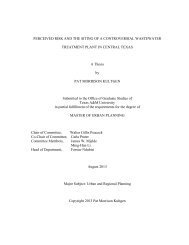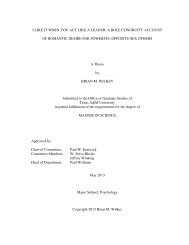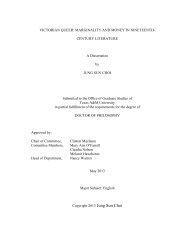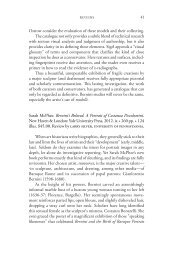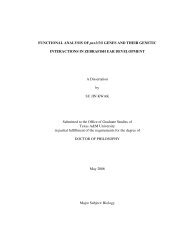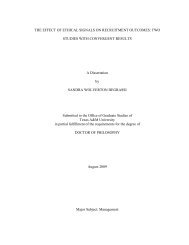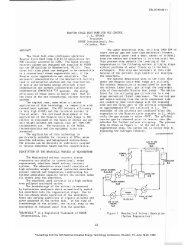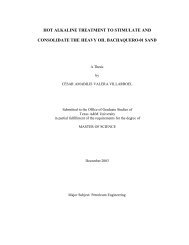INVESTIGATIONS INTO HYPERLIPIDEMIA AND ITS POSSIBLE ...
INVESTIGATIONS INTO HYPERLIPIDEMIA AND ITS POSSIBLE ...
INVESTIGATIONS INTO HYPERLIPIDEMIA AND ITS POSSIBLE ...
You also want an ePaper? Increase the reach of your titles
YUMPU automatically turns print PDFs into web optimized ePapers that Google loves.
52<br />
hepatobiliary disease in both Miniature Schnauzers and dogs of other breeds. 121,123 In<br />
humans, severe hypertriglyceridemia is also a known risk factor for pancreatitis. 254,255,262<br />
Miniature Schnauzers are generally considered to have a high incidence of<br />
pancreatitis. 63,163,165,216 In a recent study, bivariable screening showed that Miniature<br />
Schnauzers were 4.1 times (95% CI, 1.9 to 9.2; P < 0.001) more likely to have<br />
pancreatitis than dogs of other breeds. 163 The basis for this predisposition is unknown,<br />
but hypertriglyceridemia has long been considered as a possible cause of pancreatitis in<br />
the Miniature Schnauzer. 17,83,165 However, studies investigating any association between<br />
these 2 disorders in dogs are lacking, and this consideration is mainly based on clinical<br />
impressions. In vitro studies support the concept that hypertriglyceridemia can initiate<br />
pancreatic inflammation, and there is evidence that high fat diets or even a single fatty<br />
meal can induce pancreatitis in dogs. 144,165,260<br />
In contrast to hypertriglyceridemia,<br />
hypercholesterolemia does not appear to be a risk factor for pancreatitis in humans or<br />
dogs. 33,254,255<br />
Recognition of an association between hypertriglyceridemia and<br />
pancreatitis in Miniature Schnauzers is clinically important because management of<br />
hypertriglyceridemia with low-fat diets and/or lipid-lowering drugs may prevent or<br />
resolve pancreatitis in these dogs.<br />
Until recently, a clinical diagnosis of pancreatitis was problematic in dogs<br />
because no specific and sensitive tests were available. However, the recent development<br />
and analytical validation of an ELISA specific for canine pancreatic lipase, canine<br />
pancreatic lipase immunoreactivity (cPLI), has facilitated the diagnosis of pancreatitis in<br />
dogs as it has been reported to be sensitive (reported sensitivity ranging from 64% for



